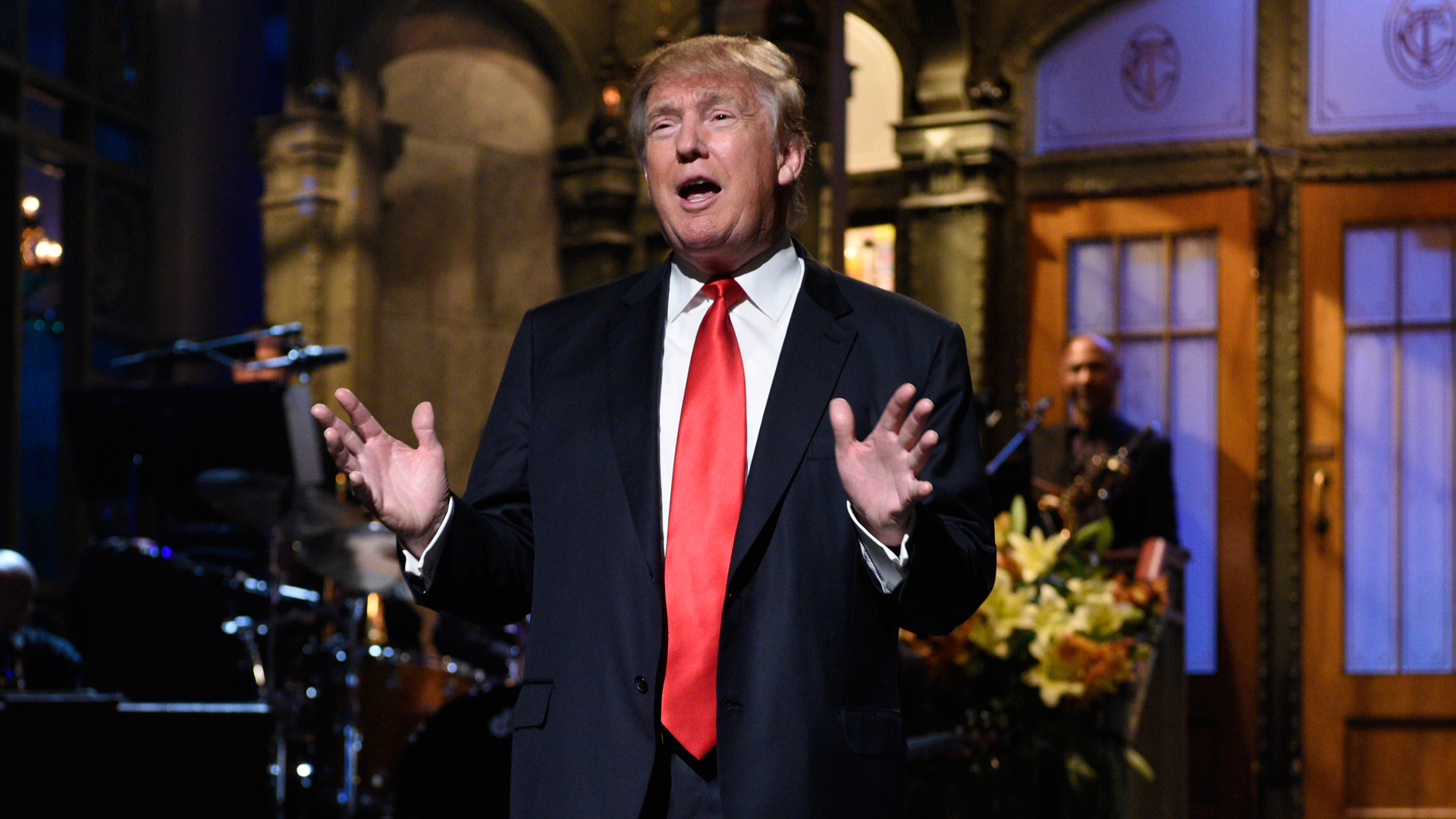The Sandernistas
Postscript on the March 15 primaries
Chris Cutrone
Platypus Review #85 | April 2016
Coda to "The Sandernistas: The Final Triumph of the 1980s," Platypus Review 82 (December 2015).
THE PRIMARY ELECTIONS for the nomination of the Democrat and Republican candidates for President have demonstrated the depth and extent of the disarray of the two parties. Sanders has successfully challenged Hillary and has gone beyond being a mere messenger of protest to become a real contender for the Democratic Party nomination. But this has been on the basis of the Democrats' established constituencies and so has limited Sanders's reach. Turnout for the Democratic Party primaries has not been significantly raised as Sanders hoped. The Republican primaries by contrast have reached new highs.

Donald Trump on Saturday Night Live.
Donald Trump has been the actual phenomenon of crisis and potential change in 2016, taking a much stronger initiative in challenging the established Republican Party, indeed offering the only convincing possibility of defeating Clinton. The significant crossover support between Sanders and Trump, however marginal, is very indicative of this crisis. Trump has elicited hysteria among both established Republicans and Democrats. Their hysteria says more about them than about him: fear of the base. Sanders has attempted to oppose the 1930s–40s New Deal and 1960s–70s Great Society and New Left base of the Democratic Party, established and developed from FDR through the Nixon era, against its 1980s–2010s neoliberal leadership that has allegedly abandoned them. Trump has done something similar, winning back from Obama the "Reagan Democrats." But the wild opportunism of his demagogy allows him to transcend any inherent limitations of this appeal.
Trump is no "fascist," nor even really a "populist," (( See Tad Tietze, “The Trump paradox: A rough guide for the Left,” Left Flank (January 25, 2016). Available on-line at <http://left-flank.org/2016/01/25/the-trump-paradox-a-rough-guide-for-the-left/>. )) but is what the Republicans accuse him of being: a New York-style Democrat (like the blowhard former 1980s New York City Mayor Ed Koch). He challenges Hillary precisely because they occupy such similar Centrist positions in U.S. politics, whatever their differences on policy. But Trump more than Sanders represents something new and different: a potential post- and not pre-neoliberal form of capitalist politics, regarding changes in policies that have continued from Reagan through Obama, driven by discontents of those alienated from both Parties. Sanders could potentially best Trump, but only on the basis of a much greater and more substantial mobilization for a different politics than it is evidently possible to muster through the Democrats. The biggest "party" remains those who don't vote. | P
P.P.S. on Trump and the crisis of the Republican Party
Chris Cutrone, June 22, 2016
Further amendment after the end of the primary elections.
Trump is no "fascist," nor even really a "populist," but is precisely what the Republicans accuse him of being: a New York-style Democrat -- like the socially and economically liberal but blowhard "law-and-order" conservative former 1980s New York City Mayor Ed Koch. Trump challenges Hillary precisely because they occupy such similar moderate Centrist positions on the U.S. political spectrum, whatever their various differences on policy. Trump more than Sanders represents something new and different in this election season: a potential post- and not pre-neoliberal form of capitalist politics, regarding changes in policies that have continued from Reagan through Obama, driven by discontents of those alienated from both Parties. Trump has successfully run against and seeks to overthrow the established Republican 1980s-era "Reagan Revolution" coalition of neoliberals, neoconservatives, Strict Construction Constitutionalist conservatives and evangelical Christian fundamentalists -- against their (always uneasy) alliance as well as against all of its component parts. Established Republicans recoil at undoing the Reagan Coalition they have mobilized since the 1980s. Marco Rubio as well as Ted Cruz -- both of whom were adolescents in the 1980s -- denounced Trump not only for his "New York values" but also and indicatively as a "socialist." Glenn Beck said that Trump meant that the America of "statism" of the Progressives Theodore Roosevelt and Woodrow Wilson had won over the America of "freedom" of George Washington and Thomas Jefferson. Of course that is ideological and leaves aside the problem of capitalism, which Trump seeks to reform. Sanders could have potentially bested Trump as a candidate for reform, perhaps, but only on the basis of a much greater and more substantial mobilization for a different politics than it is evidently possible to muster through the Democrats, whose nostalgia for the New Deal, Great Society and New Left does not provide the necessary resources.
Trump has succeeded precisely where Sanders has failed in marshaling the discontents with neoliberalism and demand for change. Sanders has collapsed into the Democratic Party. To succeed, Sanders would have needed to run against the Democrats the way Trump has run against the Republicans. This would have meant challenging the ruling Democratic neoliberal combination of capitalist austerity with New Left identity politics of "race, gender and sexuality" that is the corporate status quo. The results of Trump's contesting of Reaganite and Clintonian and Obama-era neoliberalism remain to be seen. The biggest "party" remains those who don't vote. Trump will win if he mobilizes more of them than Clinton. Clinton is the conservative in this election; Trump is the candidate for change. The Republicans have been in crisis in ways the Democrats are not, and this is the political opportunity expressed by Trump. He is seeking to lead the yahoos to the Center as well as meeting their genuine discontents in neoliberalism. Of course the change Trump represents is insufficient and perhaps unworkable, but it is nonetheless necessary. Things must change; they will change. As Marx said, "All that is solid melts into air." The future of any potential struggle for socialism in the U.S. will be on a basis among not only those who have voted for Sanders but also those who have and will vote for Trump. | P

